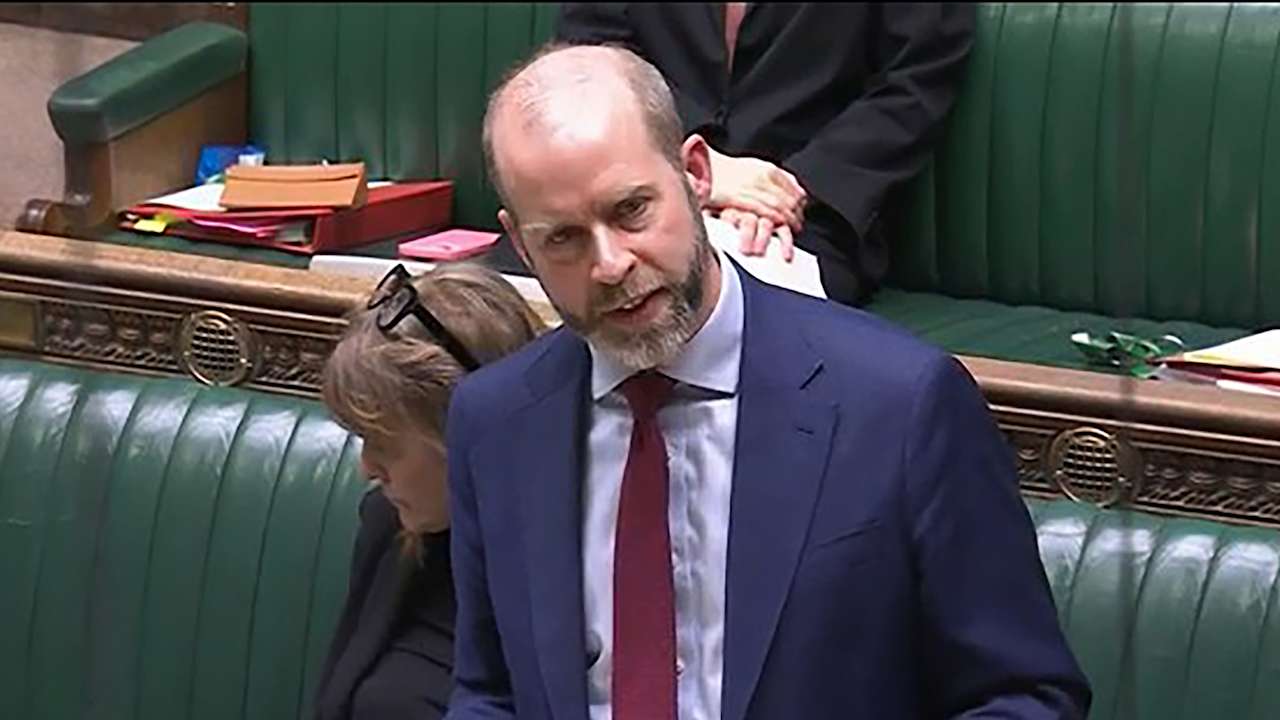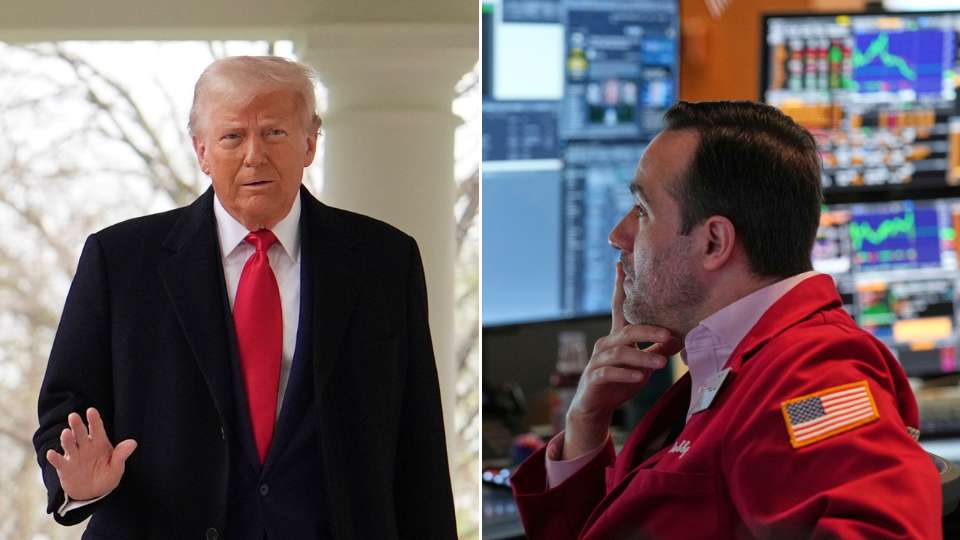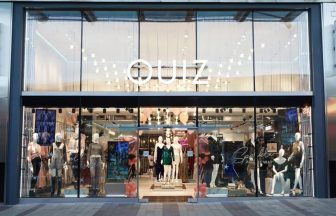China has been hit with a 34% tariff, while Canada has a 25% tax on some of its goods, as ITV News US Correspondent Robert Moore reports
Sweeping new tariffs announced on Wednesday by US President Donald Trump have provoked dismay, threats of countermeasures and sharp falls in financial markets across the world.
Trump said the import taxes, ranging from 10% to 49%, would do to US trading partners what they have long done to the US, describing them as “reciprocal.”
For the UK, Trump said he is imposing tariffs of 10% on all British imports into the United States. He also said he will impose a tariff of 20% on the European Union, while China faces a tariff of 34%.
The president and supporters of his tariffs believe that, as well as the revenue these tariffs generate, the higher import costs will encourage companies to make, buy and sell their products in the US.
But the shockwaves were already being felt across the world on Thursday, with the European Union promising to retaliate, the UK aiming to secure a trade deal and stock markets falling dramatically.
A global sell-off swept across the financial markets after the announcement, with the US’s top index plunging to a seven-month low on Thursday and European stocks facing a bruising session.
The losses were prompted by fears over the outlook for global economic growth and a possible recession in the United States.
US stocks were hit, with the top index tanking to a six-month low shortly after opening on Thursday.
European and UK markets also suffered sharp drops in the aftermath of Trump’s White House speech on Wednesday night.
In the UK, the FTSE 100 was falling around 1.5% to a three-month low of 8,476.
The US dollar also continued to drop sharply against key currencies on Thursday, including the pound.
A group of analysts for Barclays said there was a “high risk that the US economy enters a recession this year” in a note published on Thursday.
From Westminster to Washington DC – our political experts are across all the latest key talking points. Listen to the latest episode below…
What has the UK said?
Prime Minister Sir Keir Starmer told business chiefs in Downing Street that “clearly there will be an economic impact” from Donald Trump’s tariffs but the Government would respond with “cool and calm heads”, after Trump imposed 10% tariffs on British goods.
Conceding that it was Trump’s “mandate” to act for his country, Starmer added: “Today, I will act in Britain’s interests with mine.”
The prime minister said he would “fight” to secure a trade deal with the US, to mitigate the impact of the tariffs.
“Nobody wins in a trade war, that is not in our national interest.
“Negotiations on an economic prosperity deal – one that strengthens our existing trading relationship – they continue and we will fight for the best deal for Britain.”
He said he would only strike a deal with Donald Trump’s White House “if it is in our national interest and if it is the right thing to do for the security of working people, protects the pound in their pocket that they have worked hard to earn”.
What deal is the UK considering?
UK negotiators are pursuing an economic agreement with the US focused on technology.
Such a deal could include possible changes to the digital services tax – which imposes a 2% levy on the revenues of several major US tech companies – in exchange for a carve-out from the tariffs.
Scrapping this tax would create an £800 million blackhole in an already tight financial situation for the UK Treasury.
Starmer did not deny that changes to the digital services tax are being considered.
Easing access for US agricultural products to UK markets could also be on the table, although officials have insisted that food standards will not be lowered.
How could the UK respond to the tariffs?

The business secretary says the UK government is considering “possible retaliatory action” against the US in response to the tariffs on British imports.
Jonathan Reynolds told MPs in the House of Commons he was launching a four-week consultation for businesses to have their input on what retaliatory tariffs might look like, and how these would impact them.
“We reserve the right to take any action we deem necessary if a deal is not secured,” he told the Commons.
The government says that if an economic deal is agreed prior to the end of the consultation, then it will be paused.
It has drawn up an “indicative list of potential products that the Government considers most appropriate for inclusion” in any tariffs against US exports.
The list includes key US products such as Bourbon whiskey, motorcycles, guitars and jeans but also includes scores of other items ranging from whale meat to chopsticks.
Officials said the list covered 27% of the value of total imports from the US, and excluded the main American products which British companies depend upon.
How has the rest of the world responded to the tariffs?
The announcement has triggered swift reactions from major economies, with many condemning the move as reckless and protectionist.
Some countries have vowed retaliation, while others are urging negotiation to avoid an all-out trade war.
- European Union: The EU, facing 20% tariffs on all goods, European Commission President Ursula von der Leyen called the move “a major blow to the world economy,” warning: “The global economy will massively suffer, and uncertainty will spiral. The consequences will be dire for millions around the world.” Brussels is now preparing countermeasures targeting key US exports, including agricultural products and high-value manufactured goods. Trump, in response, has threatened a 200% tariff on European alcohol if the EU follows through.
- China: Facing a 34% tariff on its goods, China urged the US to cancel the measures and resolve disputes through dialogue. The Chinese Commerce Ministry issued a statement saying: “China urges the United States to immediately cancel its unilateral tariff measures and properly resolve differences with its trading partners through equal dialogue.” Analysts expect China to retaliate by imposing tariffs on US agricultural products or restricting exports of rare earth minerals critical to tech manufacturing.
- Japan: Japan, a key US ally, has taken a cautious stance, with Chief Cabinet Secretary Yoshimasa Hayashi stating that the government is “closely analysing the impact” of the tariffs while preferring dialogue over retaliation.
- Latin America: Several Latin American nations have strongly condemned the tariffs. Brazilian lawmakers have passed a bill allowing for immediate countermeasures, while Chilean President Gabriel Boric warned that Trump’s policies risk undermining international trade norms. Colombian President Gustavo Petro went further, declaring: “Today, the neoliberalism that proclaimed free-trade policies all over the world has died.”
- Australia: Australian Prime Minister Anthony Albanese sharply criticised the tariffs, rejecting Trump’s justification that they are “reciprocal.” He stated: “A reciprocal tariff would be zero, not 10%.”
The full list of tariffs imposed by the US
Below is the full table of ‘reciprocal tariffs’ announced by Donald Trump on Wednesday.
You can use the search function to look for a specific country, sort the columns alphabetically, or by the size of tariff.
‘Tariffs charged to the US’ are Trump-defined and include ‘currency manipulation and trade barriers’.
Follow STV News on WhatsApp
Scan the QR code on your mobile device for all the latest news from around the country






























